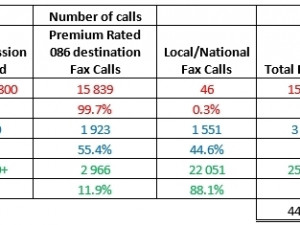Johannesburg, 28 Jun 2016
Many users in South Africa have subscribed to a free fax-to-mail service, whereby one gets a fax number from any of many providers, which delivers incoming faxes to an e-mail address inbox. Unfortunately, these services are not free to the sender of the fax, and it appears that some service providers are providing an inferior service that results in the sender of a fax to these 'free fax numbers' paying much more than they should.
Free fax-to-mail services have proven to be hugely popular in South Africa, with more than a million users signed up. Although the receiver gets a free incoming fax service, the sender of the fax pays a premium rate to Telkom based on a per-minute charge of R1.82 (including VAT). This rate is then typically shared between Telkom, three of their licensed VAS providers, a faxmail (technology) provider and an agent.
This service was introduced into the market in 2002, with myriad providers currently active. As the service has grown over the years, it has hit a plateau of available users that can make use of it. This means that revenues are also relatively stable. To continue growth and increase profits, it appears certain faxmail providers who own the fax server (modem) equipment, may be utilising inferior technology resulting in slower transmission speeds and higher revenue.
This is because the cost of sending the fax is actually variable. The rate on which a fax page is sent is dependent on the baud rate, or the connection speed which dictates how fast the data is sent. It is also important to realise that the receiver can determine the connection speed of a fax that is sent. Typical fax baud rates are 14 400bps, and the sending fax machine in almost all cases will attempt to connect at this speed, or in some cases, higher.
But, by using fax modems at a lower speed, the faxes take longer to send. A longer call in turn means a higher cost to the sender and higher income to the service provider, Telkom and others that may be involved in the business. This practice seems particularly prevalent where faxes are sent to premium-rated numbers: senders pay large amounts to send faxes to certain premium rated faxmail numbers, while the recipients remain blissfully unaware of the duration since they only get an e-mail.
Reviewing a recent study analysing a total of more than 44 000 fax calls over a six months period, the extent of the problem becomes evident:

A total of 99.7% of all slow faxes (baud rate of 2 400/4 800) are to premium rated numbers, whereas a mere .3% of all slow calls are to non-revenue generating local and national fax calls. These premium-rated faxes are delivered three to six times slower than standard 14 400 connections. The resulting economics of this are clear. Parties involved in the business receive three or six times the amount of money they would have if the fax was received at a normal speed.
It must be clearly stated that not all faxmail numbers are delivered at slow connection speeds. Indeed, when analysing the calls further, it is evident that slow calls appear to only happen to certain blocks of fax numbers. Each provider receives their own block of numbers from either Telkom or a VAS provider, indicating the issue is likely isolated to specific service providers. But, it is also important to note the extent of the problem. From the study, a full 76% of all fax calls to premium rated numbers transmitted at the very slow rate of 2 400/4 800 speeds. This compares very poorly to local/national calls, where only .002% fell into this category.
This issue has been brought to the attention of the relevant companies in the hopes that action will be taken to relieve senders of faxes to premium rated number of this expensive burden.
You can help resolve this expensive problem that results in costing nearly all South Africans in one way or another. You can test the speed of any fax number you send to from your fax machine (including your own). Most fax machines can provide a fax report on faxes you have sent. Many will include the transmission speeds of faxes you have sent. If you see speeds consistently less than 14.4 to any particular numbers, you should avoid faxing these number and inform the owner of the number that they are using an inferior service that adds great expense to you sending them a fax.
If your fax machine does not provide this information, you can use a simple rule: a typical single fax page should not take more than one minute to transmit. Typical multi-page faxes should take less than one minute per page.
Share
